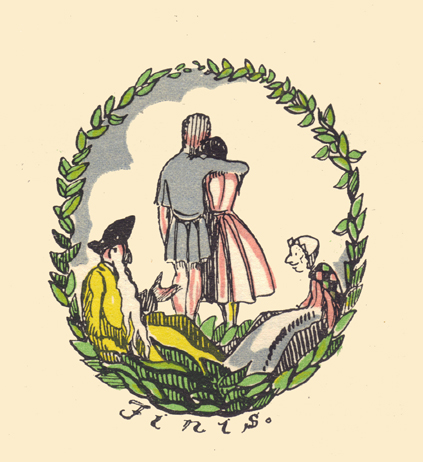
From The Luck of the Bean-Rows, a Fairy-tale for Lucky Children, illustrated by Claud Lovat Fraser, London: Daniel O’Connor, [1921]; pp. 41-61.
It would be doing scant justice to
the speed of the magic carriage to
say that it shot through space at
the rate of a rifle bullet. Woods,
towns, mountains, seas swept by
quicker than magic lantern pictures.
Far away horizons had scarcely
risen in outline from the deep-down
distance before they had plunged
under the flying carriage. The
Luck would have striven in vain
to see them; when he turned to
look back — flick! they had gone.
At last, when he had several times
outraced the sun, swept round the
globe, caught it up and again
outstripped it, with rapid changes
from day to night and from night
to day, it suddenly struck the Luck
of the Bean-rows that he had
passed the great town he was
going to and the market for his
beans.
‘The springs of this carriage are
a trifle lively,’ he thought to
himself (he was nimble-witted,
remember); ‘it started off on its
giddy race before Pea-Blossom
could tell me whither I was bound.
I don’t see why this journey
should not last for ages and ages,
for that lovely princess, who is
young enough to be something of
a madcap, told me how to start
the carriage, but had no time to
42
say how I was to stop it.’
The Luck of the Bean-rows tried
all the cries he had heard from
carters, wagoners, and muleteers
to bring it to a standstill, but it
was all to no purpose. Every
shout seemed but to quicken its
wild career.
It sped from the tropics to the
poles and back from the poles to
the tropics, across all the parallels
and meridians, quite unconcerned
by the unhealthy changes of
temperature. It was enough to
broil them or to turn them to ice
before long, if the Luck had not
been gifted, as we have frequently
remarked, with admirable
intelligence.
‘Ay,’ he said to himself,
‘considering that Pea-Blossom
sent her carriage flying through
the world with “Off, chick pea!”
it is just possible we can stop it by
saying the exact opposite.’
It was a logical idea.
‘Stop, chick pea!’ he cried,
snapping his finger and thumb as
Pea-Blossom had done.
Could a whole learned society
have come to a more sensible
conclusion? The fairy carriage
came to a standstill so suddenly,
you could not have stopped it
quicker if you had nailed it down.
43
It did not even shake.
The Luck of the Bean-rows
alighted, picked up the carriage,
and let it slip into a leather wallet
which he carried at his belt for
bean samples, but not before he
had taken out the hold-all.
The spot where the flying carriage
was pulled up in this fashion
has not been described by travellers.
Bruce says it was at the sources
of the Nile. M. Douville places it
on the Congo, and M. Saillé at
Timbuctoo. It was a boundless
plain, so parched, so stony, so
wild that there was never a bush
to lie under, not a desert moss to
lay one’s head upon and sleep, not
a leaf to appease hunger or thirst.
But Luck of the Bean-rows was
not in the least anxious. He prized
open the hold-all with his finger-
nail, and untied one of the three
little caskets which Pea-Blossom
had described to him. He opened
it as he had opened the magic
carriage, and planted its contents
in the sand at the points of his hoe.
‘Come of this what must come!’
he said, ‘but I do badly want a
tent to shelter me to-night, were
it only a cluster of peas in flower;
a little supper to keep me going,
were it but a bowl of pea-soup
sweetened, and a bed to lie upon,
44
if only one feather of a humming-
bird — and all the more as I cannot
get back home to-day, I am so
worn out with hunger and aching
fatigue.’
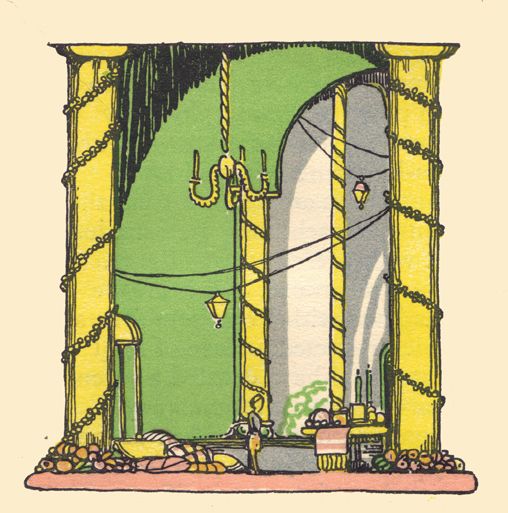
The words had scarcely left his
lips when he saw rising out of the
sand a splendid pavilion in the
shape of a pergola of sweet-peas.
It grew up, it spread; from point
to point it was supported upon
ten props of gold; it dropped
down leafy curtains strewn with
pea-blossom; it curved into
numberless arches, and from the
centre of each hung a crystal lustre
set with perfumed wax lights.
The background of this arcade
was lined with Venetian mirrors,
which reflected a blaze of light
that would have dazzled a seven-
year-old eagle a league away.
From overhead a pea leaf dropped
by chance at the Luck’s feet. It
spread out into a magnificent
carpet variegated with all the
colours of the rainbow and many
more. Around its border stood
little round tables loaded with
pastry and sweetmeats; and iced
fruits in gilded porcelain cups
encircled a brimming bowl of
sweet-pea soup, sprinkled over
with currants black as jet, green
pistachio nuts, coriander comfits
and slices of pineapple. Amid all
this gorgeous show the Luck quickly
discovered his bed, and that was
the humming-bird’s feather which
he had wished for. It sparkled in
a corner like a jewel dropped from
the crown of the Grand Mogul,
although it was so tiny that a grain
of millet might have concealed it.
47
At first he thought this pigmy bed
was not quite in keeping with the
rich furnishing of the pavilion,
But the longer he looked at it the
larger it grew, till humming-birds’
feathers were soon lying knee-deep
on the floor — a dream-couch of
topazes so soft, sapphires so
yielding, opals so elastic, that a
butterfly would have sunk deep
if he had lighted on them.
‘That will do, that will do,’
cried the Luck of the Bean-rows;
‘I shall sleep too soundly as it is.’
I need not say that our traveller
did justice to the feast that was
spread for him, and lost no time
in preparing for bed. Thoughts of
love ran through his mind, but at
twelve years of age love does not
keep one awake; and Pea-Blossom,
whom he had seen but once,
had left him with no
more than the impression of a
delightful dream, the enchantment
of which could only return in
sleep. Another good reason for
going to sleep if you have
remembrances like mine.
The Luck of the Bean-rows,
however, was too cautious to yield
to these idle fancies until he had
made sure that all was safe outside
the pavilion, the very splendour of
which was likely to attract all the
48
thieves and vagabonds for miles
round. You will find them in every
country.
So, with his weeding-hook in his
hand as usual, he passed out of
the magic circle, to make the
round of his tent and see that all
was quiet.
No sooner had he reached the
limit of the grounds — a narrow
ravine washed out by running
water that a kid might have cleared
at a bound — than he was brought
to a standstill by such a shiver as
a brave man feels, for the most
valiant has his moments of fright
which he can master only by his
resolute will. And, faith, there was
enough to make one hesitate in
what he saw.
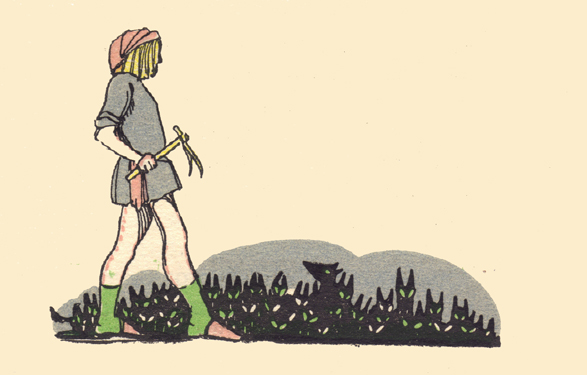
It was a battle-front where in the
darkness of a starless night glistened
two hundred fixed and burning
eyes; and along the ranks, from
right to let, from left to right,
there ran incessantly two keen
slanting eyes which bespoke an
extremely alert commander.
Luck of the Bean-rows knew
nothing of Lavater or Gall or
Spurzheim, he had never heard
of phrenology, but within him he
felt the natural instinct which
teaches every living creature to
sense an enemy from afar. At a
glance he recognized in the leader
of this horde of wolves the
wheedling coward who had tricked
him, with his talk of enlightenment
and self-control, out of his last
measure of beans.
‘Master Wolf has lost no time in
setting his lambs on my track,’
said Luck of the Bean-rows; ‘but
by what magic have they overtaken
me, every one of them, if these
ruffians too have not travelled by
chick pea? It is possible,’ he
added with a sigh, ‘that the
secrets of science are not unknown
to scoundrels, and I dare not be
sworn, when I think of it, that it
is not they who have invented
them so as to persuade simple
souls the more easily to take part
50
in their hateful schemes.’
Though the Luck was cautious in
doing, he was quick in planning.
He drew the hold-all hastily from
his wallet, untied the second
pea-casket, opened it as he had
done the first, and planted the
contents in the sand at the point of
his weeding-hook.
‘Come of this what must come!’
said he; ‘but to-night I do badly
want a strong wall, were it no
thicker than a cabin wall, and a
close hedge, if only as strong as my
wattle fence, to save me from my
good friends the wolves.’
In a twinkle walls arose, not cabin
walls, but walls of a palace;
hedges sprung up before the
porches, not wattle fences, but a
high, lordly railing of blue steel
with gilded shafts and spear-heads
that never a wolf, badger, or fox
could have tried to clear without
bruising himself or pricking his
pointed muzzle. With the art of
warfare at the stage it had then
reached among the wolves there
was nothing to be done. After
testing several points the invaders
retired in confusion. Thankful for
this relief, the Luck returned to
his pavilion. But now he passed
on over marble pavements, along
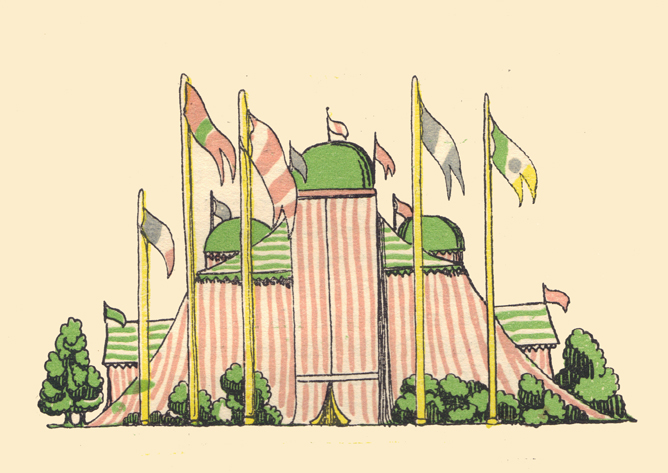
pillared walks lit up as if for a
wedding, up staircases which
seemed to ascend for ever, and
through galleries that were endless.
He was overjoyed to come upon
his pavilion of pea-blossom in the
midst of a vast garden, green and
blooming, which he had never seen
before, and to find his bed of
humming-birds’ feathers, where, I
take it, he slept happier than a
king — and I never exaggerate.
Next day the first thing he did
was to explore the gorgeous
dwelling which had sprung out
of a little pea. The beauty of the
most trifling things in it filled him
with astonishment; for the
furnishing of it was admirably in
keeping with its outward
appearance.
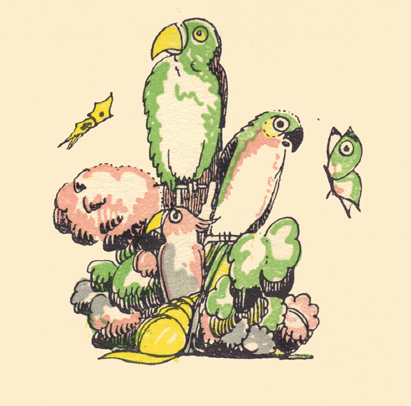
He examined, one after another,
his gallery of pictures, his cabinet
of antiques, his collections of
medals, insects, shells, his library,
each of them a wonder and a
delight quite new to him.
He was especially pleased at the
admirable judgment with which
the books had been chosen. The
finest works in literature, the most
useful in science had been gathered
together for the entertainment and
instruction of a long life — among
them the Adventures of the
ingenious Don Quixote; fairy
tales of every kind, with beautiful
engravings; a collection of curious
an amusing travels and voyages
(those of Gulliver and Robinson
Crusoe so far the most authentic);
capital almanacks, full of diverting
anecdotes and infallible information
as to the phases of the moon and
the best times for sowing and
planting; numberless treatises,
very simply and clearly written,
on agriculture, gardening, angling,
netting game, and the art of
taming nightingales — in short, all
one can wish for when one has
learned to value books and the
spirit of their authors. For there
have been no other scholars, no
other philosophers, no other poets,
and for this unquestionable reason,
54
that all learning, all philosophy, all
poetry are to be found in their
pages, and to be found only there.
I can answer for that.
While he was thus taking account
of his wealth, the Luck of the
Bean-rows was struck by the
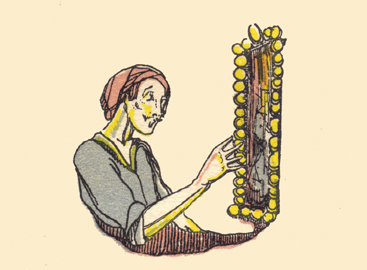
reflection of himself in one of the
mirrors with which all the
apartments were adorned. If the
glass was not fooling him, he must
have grown — oh, wonder of
wonders! — more than three feet
since yesterday. And the brown
moustache which darkened his
upper lip plainly showed that he
was passing from sturdy boyhood
to youthful manliness.
He was puzzling over this
extraordinary change when, to his
great regret, a costly time-piece,
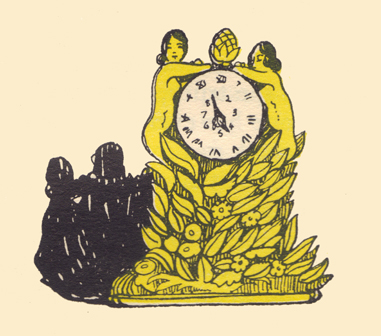
between two pier-glasses, enabled
him to solve the riddle. One of
the hands pointed to the date of
the year, and the Luck saw,
without a shadow of doubt, that
he had grown six years older.
‘Six years!’ he exclaimed.
‘Unfortunate creature that I am!
My poor parents have died of old
age, and perhaps in want. Oh,
pity me, perhaps they died of
grief, fretting over the loss of me.
What must they have thought in
their last hours of my deserting
them or of the misfortune that
had befallen me!
‘Now I understand, hateful
carriage, how you came to travel
so fast; days and days were
swallowed up in your minutes. Off,
56
then; off, chick pea!’ he
continued as he took the magic
coach from the wallet and flung it
out of the window; ‘out of my
sight, and fly so far that no eye
may ever look on you again!’
And to tell the truth, so far as I
know, no one has ever since cast
eyes on a chick pea In the shape
of a post-chaise that went fifty
leagues an hour.
Luck of the Bean-rows descended
the marble steps more sorrowfully
than ever he went down the ladder
of his bean-loft. He turned his
back on the palace without even
seeing it; he traversed those
desert plains with never a thought
of the wolves that might have
encamped there to besiege him.
He tramped on in a dream,
striking his forehead with his hand
and at times weeping.
‘What is there to wish for now
that my parents are dead?’ he
asked himself as he listlessly
turned the little hold-all in his
fingers, ‘now that Pea-Blossom
has been married six years? —
for it was on the day I saw her
that she came of age, and then the
princesses of her house are married.
Besides, she had already made her
choice. What does the whole world
matter — my world, which was made
57
up of no more than a cabin, a
bean-field — which you, little green
pea,’ and he untied the last of the
caskets from its case, ‘will never
bring back to me! The sweet days
of my boyhood return no more!
‘Go, little green pea, go whither
the will of God may carry you,
and bring forth what you are
destined to bring, to the glory of
your mistress. All is over and
done with — my old parents, the
cabin, the bean-field and Pea-
Blossom. Go, little green pea, far
and far away.’
He flung it from him with such
force that it might have overtaken
the magic carriage had it been of
that mind; then he sank down on
the sand, hopeless and full of
sorrow.
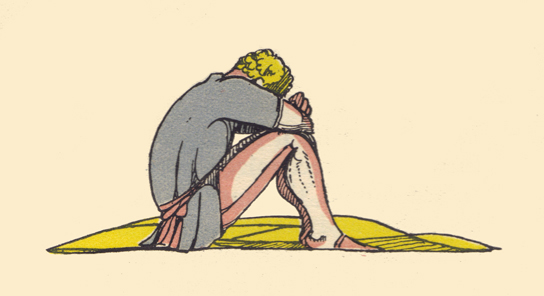
When Luck of the Bean-rows
raised himself up again the entire
appearance of the plain was
changed. Right away to the
horizon it was a sea of dusky or
of sunny green, over which the
wind rolled tossing waves of white
keel-shaped flowers with butterfly
wings. Here they were flecked
with violet like bean-blossom,
there with rose like pea-blossom,
and when the wind shook them
together they were lovelier than
the flowers of the loveliest garden
plots.
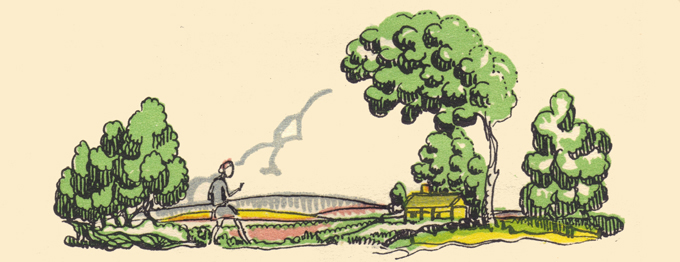
Luck of the Bean-rows sprang
forward; he recognized it all — the
enlarged field, the improved cabin,
his father and mother alive,
hastening now to meet him as
eagerly as their old limbs would
carry them, to tell him that not a
day had passed since he went
away without their receiving news
of him in the evening, and with
59
the news kindly gifts which had
cheered them, and good hopes of
his return, which had kept them
alive.
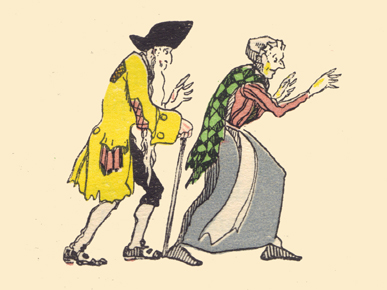
The Luck embraced them fondly,
and gave them each an arm to
accompany him to his palace. Now
they wondered more and more as
they approached it! Luck of the
Bean-rows was afraid of
overshadowing their joy, yet he
could not help saying: ‘Ah, if
you had seen Pea-Blossom! But
it is six years since she married.’
‘Since I married you,’ said a
gentle voice, and Pea-Blossom
threw wide the iron gates:
‘My choice was made then, do
you not remember? Do come in,’
she continued, kissing the old man
and the old woman, who could not
take their eyes off her, for she too
60
had grown six years older and was
now sixteen; ‘do come in! This
is your son’s home, and it is in
the land of the spirit and of day
dreams where one no longer grows
old and where no one dies.’
It would have been difficult to
welcome these poor people with
better news.
The marriage festivities were held
with all the splendour befitting
such high personages; and their
lives never ceased to be a perfect
example of love, constancy, and
happiness.
this is the usual lucky ending of
all good fairy tales.
